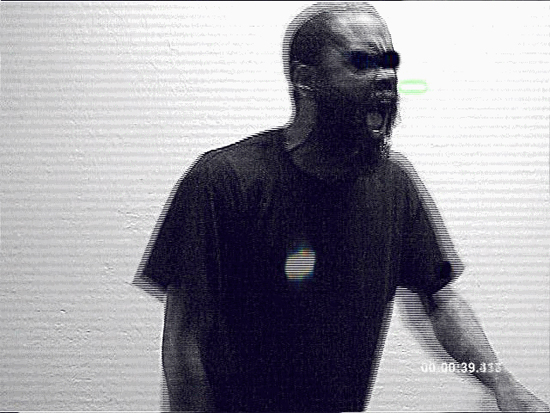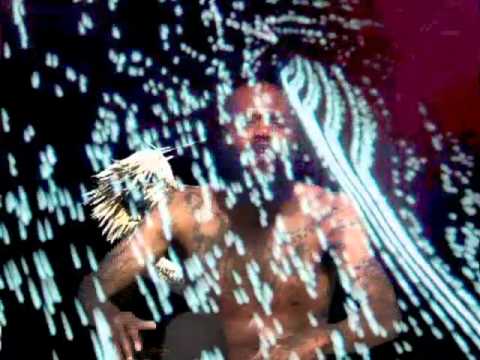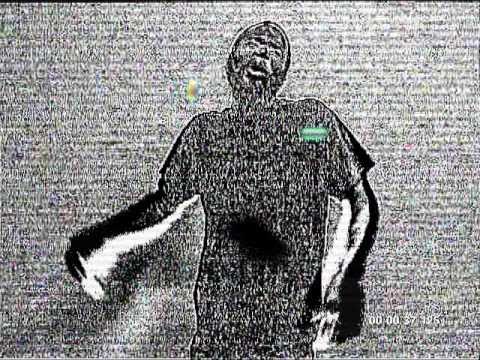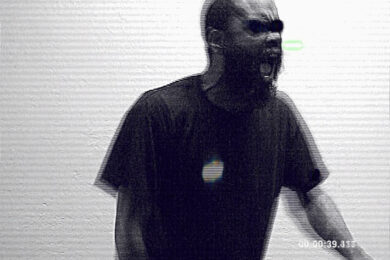Brutal, bodacious, ugly like twisted-metal, obnoxious as a shot-out kneecap, completely barmy. Lightning Bolt are great aren’t they? If only they made hip hop like that.
And as if by magic…
For a neat description of Death Grips’ ungodly racket you need only take a stroll through MC Ride’s diseased mind, essentially the de facto setting for the West Coasters’ Exmilitary, the most scintillatingly confrontational hip hop album to emerge in years. Between foretelling divine wrath, blatting out nightmarish free associative imagery and remonstrating with nearby squirrels, the interfacial, disembodied MC Ride – a damned soul in a twisted bind – will proffer the odd phrase perfectly in step with the acid bath terror-ride unfolding around him. It might be in the context of eating a dead dog he found behind the house, but there’s something self-reflexive about talk on ‘Guillotine’ of "relentless raw movement" and "hidden art, between and beneath" or "serial number, killing machine…stomp music seriously!" – the later of which more or less nails it. Put’ em all together and you get the idea: murder spelt backwards is MC Ride and if pain be the great educator, it’s back to school with you. Guillotine… Yah!
Bona fide hip hop phenoms, MC Ride, Mexican Girl, Info Warrior, back-room tsar Flatlander and polymath drummer Zach Hill are collectively the masterminds behind what after three months of listening still seems like a freak occurrence in the genre. Exmilitary reboots the very form itself, engineering an unconstructed, wires-exposed killing machine for the despatching of rap’s moneyed dandies, and a constant, indeed relentless source of delight for extreme music fans. The purest affront on cashmoney culture you could conceive of, their incendiary mixtape outguns, outwits and quite simply puts to shame their domesticated counterparts in the trebly heights of chintzy Diamante-rap.
‘Freddy Vs Jason’, DJ Yung Tellem: "Welcome to my nightmare…"
A super-kinetic blend of stringent electronics (the shock) and browbeating belabor (the awe), Exmilitary presents a flailing but intricate sound, an eruptive but clinical force akin to controlled demolition: "Subatomic penetration, rapid fire through your skull" (‘Takyon’) is Ride’s phrasing. After breaking hip hop down into its smallest components, with an absolute joy in rhythm and velocity, they have build up a bestial, gate-folded and breathlessly dynamic new formula for bad omen rap. Both rampant and rapier, a mix of the organic and cutting-edge wizardry blends the macabre and the cybernetic, the gothic and the modern – and more brilliantly than a great many of those who’ve come before them. Salem may have the dread, but can they stir up a good circle pit? Can you get down to it? Can you let go?
In the field of spooked, bad-vibes dance music, alongside various footwork artists like DJ Yung Tellem and RP Boo, the Californians currently hold the patent on futuristic, horror-driven urban: hip hop to get at the evil in you. There’s something very sci-fi about ‘Takyon’, ‘Lord Of The Game’ ‘Culture Shock’ and ‘Thru The Walls’ – 3rd world raves both grungily vérité and virtual, jacked into a frantic mainframe and ruled over by a militiaman with the appearance of a black planet shaman and the formidable presence of a sleep-deprived Frankenstein. It’s neon-lit but crumbling like the acid-eroded architecture of Blade Runners‘s neo-L.A. and though the entire length of its centre runs an artery of cold-blooded paranoia. They’ve christened their recording studios The Klink, as in a prison, which on the eponymous track they imagine to be under constant attack from shadowy ninja-like creatures and the local police respectively.
Displaying all the characteristics of a phenomenon in the making, alongside recent releases from Shabazz Palaces, Main Attrakionz, Araab Muzik and Odd Future, Exmilitary is often invoked by a growing consensus convinced that hip hop is undergoing some form of transformation. Either that or leftfield hip hop is going pop. At any rate, in future the hip hop cognoscenti will have to give serious consideration as to what qualifies as vital in mainstream rap. Bad news for them, good news for us. Let’s call it a comeback.
The Quietus took a knee with founder member Flatlander to discuss the future.
How did you meet? Is Zach Hill a hard man to avoid in Sacramento?
Flatlander: We met through mutual friends and a couple of us lived on the same block for a few years. Zach is around in Sacramento, but pretty reclusive and in and out of town.
How did you conceive of Death Grips? Were there any no-go areas established or creative goals you fixed in your head, before going forward?
F: It’s an energy outlet. We’re out to make classic records and future music. There are no boundaries.
Death Grips – Exmilitary by deathgripsCan you explain the title of your album?
F: We chose the title because of its connotations. It’s a loaded word that inspires instant visualization, a knee-jerk judgement. Society will have its pre-conceptions of us, but there is no good or evil, only a complex series of experiences and circumstances – [referencing hermetics] ‘as above so below’. Heroes and villains are man-made concepts, and it’s society that dictates where it is you come in the spectrum.
Exmilitary seems a million miles from mainstream hip hop in its current form. From your raw, goonish style and ragged production (reminiscent of Gaslamp Killer) can we infer an opposition to these styles? Any pet hates when it comes to the contemporary big league?
F: The music is not reactive in sound or aesthetic. We make things very naturally. It’s raw because we’re raw. We size up our work next to our own ideas of how the future will look, feel and sound, not in relation to what other artists – mainstream or otherwise – are doing.
Do you think ‘indie hip hop’ has a unique value-system?
F: I wouldn’t generalize things like that. A value system is a highly individual thing.
Do you ever feel there’s a reactionary element resisting change in hip hop?
F: Not just in hip hop, in everything. In most concepts the unknown is initially threatening to people in most contexts.
It seems like a really good time to release Exmilitary, coinciding with indie hip hop’s most high-profile release of its lifetime – Goblin. You are receiving a lot of blog-space on account of Exmilitary, but also from music fans rushing to compare and contrast you with Tyler and co. Do you have an opinion on OF?
F: Yes, we have a lot of respect for what they are doing creatively.
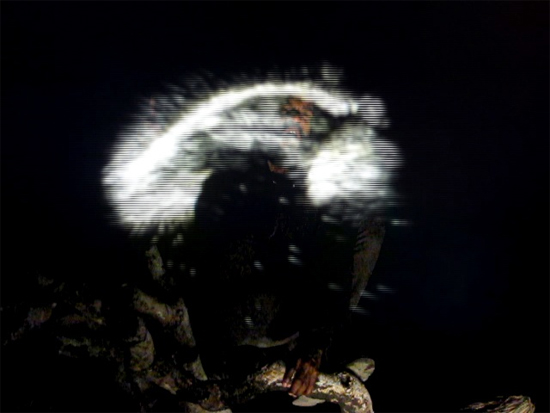
As was the case with pre-signed Odd Future, you have offered up your material free-of-charge on the web. In today’s climate is this increasingly the only viable channel a hip hop act can use to establish themselves? I ask this in mind of the likes of Lil’ B who cultivated his fan base on the internet over a series of years?
F: We welcome a situation in the future where all digital information is free for the people, but where all physical releases are also available to purchase for the people that are into the material aspects of owning the record, or are rooted in the record store culture.
What strikes you on first listen is how utterly accessible Exmilitary is. While it might not be what you term pop music, the songs are consistently catchy. Was there a conscious effort towards remaining exoteric? The avant labels like Def Jux and Anticon have seldom released anything quite as undeniable.
F: That’s a conscious thing on our part. We write with popular structure in mind. We make universal music and universal songs.
What role does Info Warrior play within the band?
F: Co-music production and co-video production.
There are several tracks dealing with the police (‘Klink’, ‘Thru The Walls’). Can you tell us a little about how it is living in Sacramento in 2011, outside the establishment. It has a reputation as a multicultural but perhaps conversely a peaceful city. Do you see Death Grips as a product of the area?
F: Yeah, it’s very diverse but also very ‘California Conservative’. It’s the [state] capital which automatically makes it a heavily regulated environment. Living on the fringes we’ve all experienced being apprehended and harassed by the police many times. I wouldn’t call it peaceful at all. Maybe out in the suburbs, but that highly depends on what neighbourhood you’re frequenting. Where we are at it’s vagrant, violent and drug-addicted. There are no frills out here, it’s raw.
Is there anyone you have your money on in the locality? Oakland’s Main Attrakionz seemed to be doing something really special.
F: Main Attrakionz are great. There’s a lot of amazing creative people in this region doing their thing.
In the video for ‘Guillotine’ we’ve noticed MC Ride is careful to wear his seatbelt, adding to the impression that the character he projects isn’t someone you want to be sitting beside on a long flight. Almost like he’s a good citizen, repressed, buttoned up, conscientious about the rules, but on the verge of going off the deep end. Was this intentional, an oversight, or just good in-car safety?
F: Yes, of course it’s intentional. We obviously had the option and foresight to not use a seatbelt, but that misses the point. It is not real – the outside is static, the inside is static, and the seatbelt is fucking static. Everything is static, just eating away at the individual. The material world and many things within it are designed to keep us half-dead, and we’re trained to think these things are keeping us safe. We reference the weaponry of fear and our music and vision isn’t about being hard or tough, it’s about being real and raw, and feeling our shit. We counter with energy, everything is energy.
You get all types of high concept taglines thrown at you, from "like ODB listening to Fugazi, while chainsawing Portishead’s studio" to "Edgar Allen Poe + NIN". I also hear a grime influence, conceivably shades of HEALTH, New York art rock like Black Dice, Liars, footwork, noise, MIA and no wave (clues – the Charles Mansun quote; the fatalism, talk of self destruction; "Fuck Yourself " goes ‘Culture Shock). Can you settle the score? Can you site a few primary influences?
F: Human nature and how we experience it, or perceive it individually and collectively, is our main influence. Music is the dumpster that we throw that trash into and other people dig around in there for things that they can use or relate too. We all dig for the trash.
It seems that while Odd Future rail against their horrorcore label, it’s Death Grips who can legitimately claim to being distinct from the archetypal h-core sound, despite the unrelentingly macabre subject matter on Exmilitary. On account of the beats mostly, which also mark you out from the pre-millennial paranoiac stuff released on Def Jux, most notably it’s an obvious departure from EL-P’s material.
F: We lay claim to nothing. Death Grips is its own process with its own headspace. It enters and exits alone.
‘Lord Of The Game’, ‘Takyon’ and ‘Thru The Walls’ feature tribal/ reggaeton rhythms. I hear a little bit of Angolan Kuduro; a kind of brittle, deep-bass, techno-informed funk which is danced to with a zombie-like, electro-convulsive mania. In its original form it’s a delirious, nonsense music and very subtly dark. In Portuguese Kuduro translates as ‘hard ass’ or ‘stiff bottom’ – kind of a perfect description for Exmilitary‘s particular cadence. Any connection? As with Kuduro, the world beats on Exmilitary should by rights provide some colour, but somehow don’t. It’s a leaden palette.
F: Rhythmically we are very into a primal feel, stomps, pulses etc, which are the rhythms that are naturally wired in all of us. The use of negative space within bounce is also a mantra. The emphasis is on feeling that point where sound is not happening within a beat, making silence the groove.
Taking into consideration the low-tech, pixellated look to your video; the visuals you use at the secret Press Club gig on YouTube which depict a screen desktop falling foul to viruses; and the electromagnetic, distorted textures on the record (redolent of James Pants), there seems to be a reoccurring motif of ‘information overload’. It’s a term Alvin Toffler coined in Future Shock and also alluded to on Death Grips’ ‘Culture Shock’ [DG’s most data-damaged track where MC Ride implores the listener to ‘Chock Yourself’]. This sensory angst seems to be a running theme on Exmiltary?
F: Yes, we make reference to masochism by information. The name of our band alludes to a technological stalemate, a war of attrition that will exact its price on our bodies.
The overload also plays into what is an embarrassment of styles, the density of the sound and the fact that the album plays like a radio broadcast. Almost like a post-digital, impossible crate-digging session?
F: It sounds like a broadcast because it is a broadcast.
It’s almost as if Death Grips’ music is determined by the method of distribution? That’s to say the technology is the message, not the medium.
F: It is both. There is a element of duality in every facet of Death Grips.
There seems to be a British influence on here – shades of Kevin Martin, techstep and IDM. How much have you had to do with British music?
F: Yes, we listen to a lot of British music. More so on the electronic and/or psychedelic side of the sound.
Is ‘Takyon’ in reference to the hypothetical sub-atomic particle by the same name, purported to travel faster than the speed of light?
F: Yeah. We’re very into science. ‘Takyon’ is in reference to the particle, and in-song, it’s a metaphor representing the sensation of either becoming that particle or harnessing its energy.
How did you come up with ‘Guillotine’? It turns on a knife-edge, that song.
F: Death on death, die or be dead.
Would you describe your music as surreal?
F: Partially… Death Grips are an outlet and a way to connect with people through something other than conversation or analyzation, to create something we don’t have words for yet.
Pairing hip hop with the aesthetics of mental illness has always seemed like a world of subversive possibilities to me. Imagine a landscape where the hip hop male has no control. The genre’s relationship with mental illness has been a conspicuously sporadic one, theoretically because it’s a culture where depression is viewed as a weakness and psychosis equates to a state of being out of control; control being a denominator all male rappers must convey if they are to beat the street.
MC Ride’s most obvious progenitor, DMX, was committed last year, along with Gucci Mane, while in 2008 The Game broke down on camera shortly after admitting to XXL magazine that he was having suicidal thoughts. Tyler The Creator wouldn’t be nearly the same artist without his ‘issues’, while an artist closely aligned with Death Grips, James Pants, titled his recent EP My Troubled Mind. All of a sudden we are confronted with MC Ride holding his head together by the temples in the promo for ‘Guillotine’ (which you directed) and it seems like a direct acknowledgement of a malady plaguing more of our hip hop stars than is publicized.
While horrorcore could be understood as an outgrowth from the high early mortality rates faced by inner city teens (Death from firearm is still the leading cause of death for black males ages 16 – 25), what Death Grips traffic in is subtly different; what could be termed ‘psycho rap’. If Death Grips were a patient, their condition would be the type depicted in Darren Aronofsky’s math horror Pi. So say My Dark Twisted Fantasy is some Fauvist dysmorphic self-portrait, Death Grips embroils MC Ride’s consciousness in a schematised Braque-esque maze, a gloaming constellation, a synaptic thing.
F: We don’t give a fuck that rap stars or music people are mentally ill. That’s a joke. We see and experience what people call mental illness every day, and have personally lost many friends and family to relatable head spaces. It is subjective and very complex. I think our view point is that everyone is mentally ill including ourselves, and so that naturally reflects in our art and content. But what some people call ‘mental illness’ can also be seen as a survival mentality to others or those experiencing it. Everyone is sick, to some degree.
Ride is willing that madness, revelling in it – conceivably for art’s sake, which brings us back to no wave. I especially like the image "I’m blowing anthrax off my palms" from ‘Culture Shock’.
F: That’s a fear reference….
You could argue that it’s the strains and constraints of fronting a masculine facade that results in the creation of dual personas. Consider Eminem, whose remarkably dark single ‘Guilty Conscience’ put Dr Dre head-to-head with Slim Shady for Marshall Mathers’s soul, in a duologue which served to further mythologize the rappers’s trifurcated persona. But you get the feeling that Ride is unable to syphon his corruption into a second body, so he’s bursting at the seems, or trapped, as he is in your videos in an electronic looking glass (and angry about it). Your promo for ‘Full Moon’ reminds me of Aphex Twin’s television image in the video for ‘Come To Daddy’.
F: We have concepts, but there are no ‘characters’ or ‘persona’s’ in this group. We have no use for an alter-ego because we aren’t on a masculine, tough guy trip. Or ego thing in the first place.
Can you offer us any clue as to what direction your debut proper will take? Currently there seems to be two sides to Death Grips; the rock/guitar aspect and the electronic side. Then there’s ‘Full Moon (Death Classic)’ which is harsh and stripped back, essentially Ride and percussion.
F: We are recording nowm at the same studio Exmilitary was recorded, with the same group of people. We record what we refer to as ‘familiar music of the future’. It has to be blowing systems in 2099. So far, everyday has been different.

